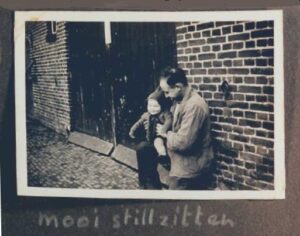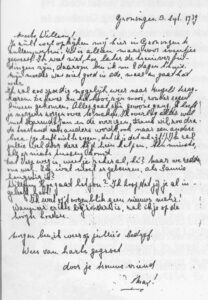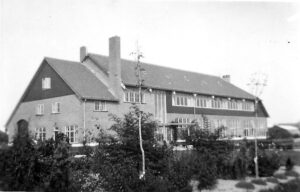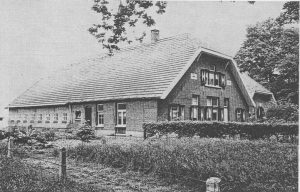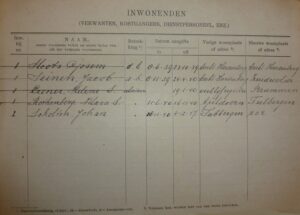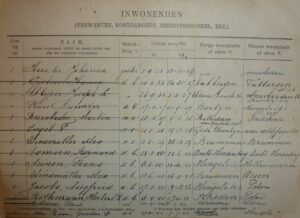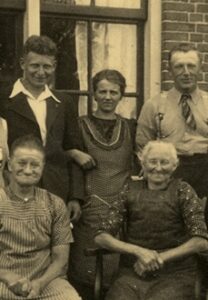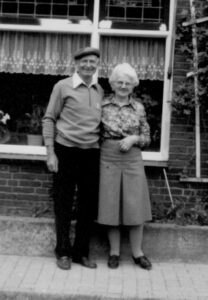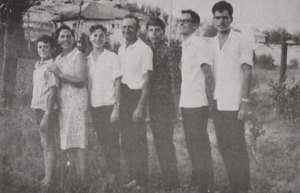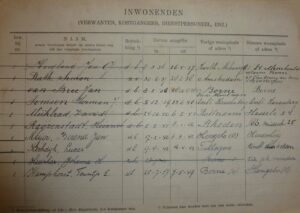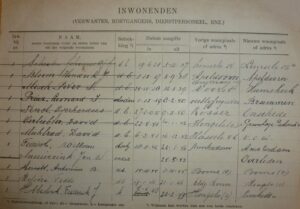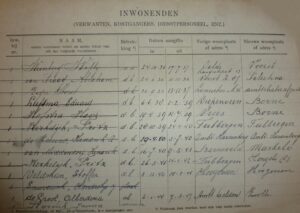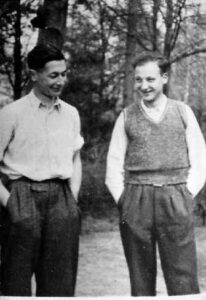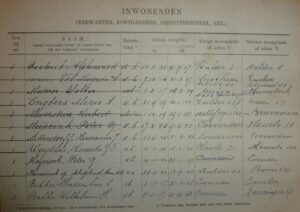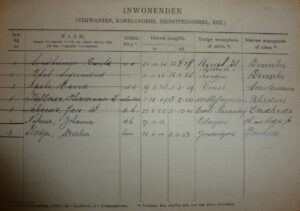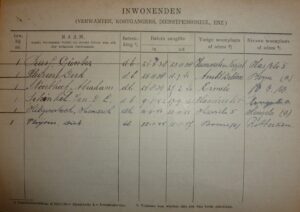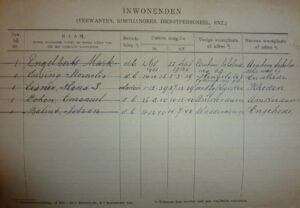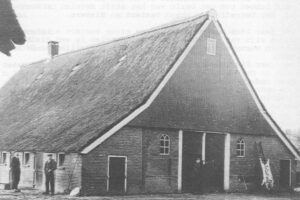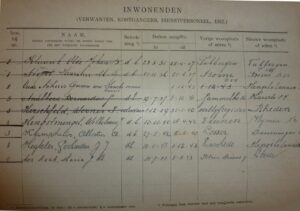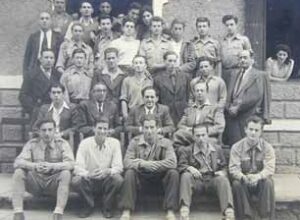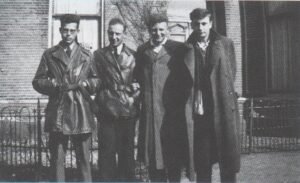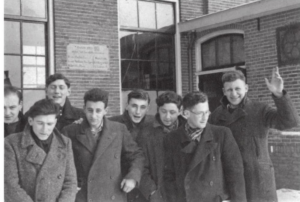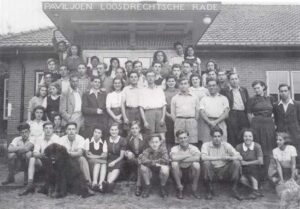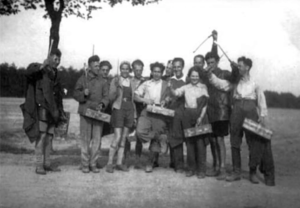In the search for war victims from the municipality of Weerselo, I found a remarkable discovery in the municipal archives. It turns out that in this town between 1934 and 1942 thirty-six Palestine-pioneers lived. Palestine-pioneers were Jewish youngsters who, by following an agricultural education, were preparing for migration to what was then Palestine, split up in Palestine and Israel since 1948. Among them were also many German Jews. A few of them later joined the Westerweel group. One of the best known was Max Windmüller, who lived in Hasselo with the family ter Haar.
The history of Max Windmüller
- Born 17-02-1920 in Emden, Germany.
- Deceased 21-04-1945 in Cham, Germany.
- Parents Moritz Windmüller, butcher, and Jette Seligmann.
- Engaged to Meta Lande.
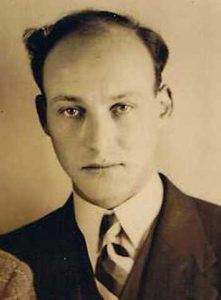 Max stayed from February 11, 1939 to December 28, 1939 and again from June 18, 1940 to March 26, 1941 as a farmhand with the Dutch Reformed family ter Haar ‘De Koekoek’ in Hasselo no. 42. Before that and in the intervening period, he stayed in Brummen. After Hasselo he left for Assen. He got along well with the ter Haar family, there has been contact for a long time and his photo album also contains many photos from this period.
Max stayed from February 11, 1939 to December 28, 1939 and again from June 18, 1940 to March 26, 1941 as a farmhand with the Dutch Reformed family ter Haar ‘De Koekoek’ in Hasselo no. 42. Before that and in the intervening period, he stayed in Brummen. After Hasselo he left for Assen. He got along well with the ter Haar family, there has been contact for a long time and his photo album also contains many photos from this period.
Max came from a family with five children, his parents had a thriving butcher shop in Emden, but all the prohibitions made it impossible for them to work. In 1933 they fled to Groningen, where his father died in 1937. Once in the Netherlands, Max joined the group of Palestine pioneers led by his brother Isaac. He received his agricultural training at the Zeijerveld in Drenthe. The so-called Deventer Association, with which Zeijerveld maintained close contact, did not have its own residential or work location. The students lived and worked with farmers all over the Netherlands. For theoretical subjects and cultural activities they came together in the association building ‘Beth Chaloets’ in Deventer. There were many mutual contacts, also with other associations.
When his brother Isaac boarded the ship the ‘Dora’ * Max accompanied him. At the last moment, he agreed to stay in the Netherlands to help lead the Palestine pioneers. During his stay at the Loosdrechtse Rade he met his later fiancé Metta Lande, a Jewess who had fled Vienna. From June 1940 to the end of March 1941 he stayed again with the ter Haar family, after which he moved to 54 Rolderstraat in Assen. In 1942 he joined the resistance group of Joop Westerweel.
* On Sunday morning, July 16, 1939, the ‘Dora’ departed from Amsterdam, with more than 300 Jewish refugees from Nazi Germany on board, and about 20 Dutch Jews. They also included eight Weerselose pioneers. The ship went to Antwerp and Vlissingen and picked up at least 200 German-Jewish refugees there. It was the last ship with refugees that left the Netherlands.
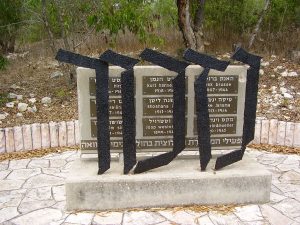 Westerweel Group – From the Loosdrechtse Rade – the inhabitants of this pavilion were largely young people from Nazi Germany and Austria, who had been brought to the Netherlands in the autumn of 1938 without parents or family – the German refugee Joachim Simon (+1943) set an extensive network to accommodate people in hiding and to organize escape routes. He did this together with the Rotterdam teacher and pacifist Johan Gerard (Joop) Westerweel (+1944) and his wife, Wilhelmina Dora Bosdries (+1999). The characteristic of this resistance group was that both Jews and non-Jews were part of it. The Jewish participants were mainly Palestine pioneers. Members of the Deventer Association fully participated. Thanks to the efforts of the Westerweel group, some 400 young German Jews were saved. Just in time this group found out about the plans to deport the children of the Loosdrechtse Rade. On August 16, 1942, more than thirty children were taken from there and housed in hiding places.
Westerweel Group – From the Loosdrechtse Rade – the inhabitants of this pavilion were largely young people from Nazi Germany and Austria, who had been brought to the Netherlands in the autumn of 1938 without parents or family – the German refugee Joachim Simon (+1943) set an extensive network to accommodate people in hiding and to organize escape routes. He did this together with the Rotterdam teacher and pacifist Johan Gerard (Joop) Westerweel (+1944) and his wife, Wilhelmina Dora Bosdries (+1999). The characteristic of this resistance group was that both Jews and non-Jews were part of it. The Jewish participants were mainly Palestine pioneers. Members of the Deventer Association fully participated. Thanks to the efforts of the Westerweel group, some 400 young German Jews were saved. Just in time this group found out about the plans to deport the children of the Loosdrechtse Rade. On August 16, 1942, more than thirty children were taken from there and housed in hiding places.
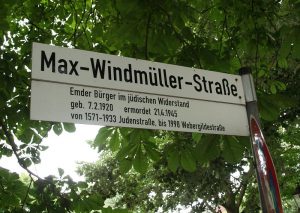 Arrest and in hiding – Max Windmüller was arrested on 14 August 1943 during a raid in Amsterdam and taken to Westerbork transit camp. After only four days he managed to escape in a laundry cart and continued his resistance work. He was housed, together with his brother Emil, with Frans and Henny Gerritsen in Haarlem. As a printer, Henny Gerritsen was able to forge all kinds of official documents. Thanks to him, Max Windmüller got a new identity ‘Co Andringa’.
Arrest and in hiding – Max Windmüller was arrested on 14 August 1943 during a raid in Amsterdam and taken to Westerbork transit camp. After only four days he managed to escape in a laundry cart and continued his resistance work. He was housed, together with his brother Emil, with Frans and Henny Gerritsen in Haarlem. As a printer, Henny Gerritsen was able to forge all kinds of official documents. Thanks to him, Max Windmüller got a new identity ‘Co Andringa’.
Working in France – Max Windmüller increasingly shifted his field of activity to France. He became the liaison officer of the Westerweel group in Paris, where he went to live with his fiancé Metta Lande. His task was to guide the refugees in groups of a maximum of four people from the green border through Belgium and France to the Spanish border. He traveled tirelessly between the Netherlands, Belgium, Brittany, Paris and the South of France. In the process, he managed to help a hundred young people, including his brother Emil, on their way to freedom. Max had been working with the French Jewish resistance movement for some time. This group wanted help from London and in the meantime was in contact with two agents, who had presented themselves as members of the British secret service. This was fatal for them, because these contacts turned out to be double spies who also worked for the Gestapo. During a meeting of Max with the leaders of the French resistance in Paris on July 18, 1944, the Gestapo invaded and everyone was arrested. They were suspected of high treason and espionage and taken to the ‘Durchgangslager Drancy’ north of Paris. As the Allies approached Drancy, the most important political prisoners, including Max, were taken to Buchenwald concentration camp by the very last transport on 17 August 1944. He was put to work as a forced laborer in an armor plate factory in Bochum and brought back to Buchenwald shortly before the end of the Nazi dictatorship. From here, the prisoners were transported in a cattle car to Flossenbürg, where their ‘death march’ to Dachau began with the Allies on their heels. Meanwhile, Max was seriously weakened and half starved. On April 21, 1945, the fourth day of this trip, Max wanted to drink some water from a well where he was shot by a guard. He died one day before the liberation of this group of deportees in Winklarn, Kreis Cham. His grave is not found.
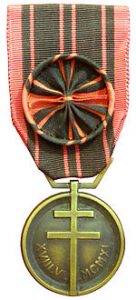 Awarded – In 1946 Max Windmüller was posthumously awarded the medal of the French resistance ‘la Résistance Française’. In the Westerweel forest in Ramat Menashe / Israel is a memorial for Joop Westerweel, Max Windmüller and their fellow combatants. The Max-Windmüller Foundation, named after him, was established in Emden / Germany and the Webergildestrasse in Emden was renamed Max-Windmüller-Strasse on 8 November 1998. The ter Haar family was present. In 2015 the new gymnasium on the Steinweg was named after him. His birthday was commemorated here on 17-02-2020. Previously, Stolpersteine were laid at Mühlenstrasse 4 in Emden. There is also a Stolperstein at the Javastraat 3 in Assen.
Awarded – In 1946 Max Windmüller was posthumously awarded the medal of the French resistance ‘la Résistance Française’. In the Westerweel forest in Ramat Menashe / Israel is a memorial for Joop Westerweel, Max Windmüller and their fellow combatants. The Max-Windmüller Foundation, named after him, was established in Emden / Germany and the Webergildestrasse in Emden was renamed Max-Windmüller-Strasse on 8 November 1998. The ter Haar family was present. In 2015 the new gymnasium on the Steinweg was named after him. His birthday was commemorated here on 17-02-2020. Previously, Stolpersteine were laid at Mühlenstrasse 4 in Emden. There is also a Stolperstein at the Javastraat 3 in Assen.
He is honored in the Dutch and French memorial room in the Yad Vashem Museum and in the Ghetto Warriors Museum Beit Lochamei Haghettaot, both in Israel and in the Virginia Holocaust Museum in Illinois / USA. A book was released in 1997: ‘Max Windmüller 1920-1945’ written by by Klaus Meyer-van Dettum and in 2010 a film / documentary about his life: ‘Deckname Cor, die dramatic Geschichte des Max Windmüller’.
A monument was unveiled in Amsterdam in 1988, dedicated to the Jewish resistance fighters. At least a thousand Jews were directly involved in the resistance. Half of them had to pay for this with death. Max Windmüller was one of those five hundred.
His family
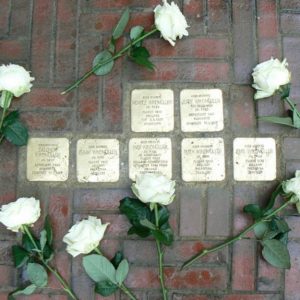 Salomon, Max’s eldest brother, was deported from Westerbork camp to the Auschwitz concentration camp together with his wife Ruth and their baby on November 30, 1942. His mother, the widow Jette Windmüller-Seligmann, had engaged in marriage with Salomon’s father-in-law, Max Kornblum. However, the marriage could not be solemnized because they were deported on December 12, 1942. All were killed, Jette, Ruth and her father were murdered immediately upon arrival. Salomon and the baby were murdered in 1944. Her other children Isaak (+1999), Emil (+1992) and Ruth (+2000) survived the war. Metta Lande also survived the war, she emigrated to Israel, where she married and was known as Shulamit Roethler. She passed away in 2017.
Salomon, Max’s eldest brother, was deported from Westerbork camp to the Auschwitz concentration camp together with his wife Ruth and their baby on November 30, 1942. His mother, the widow Jette Windmüller-Seligmann, had engaged in marriage with Salomon’s father-in-law, Max Kornblum. However, the marriage could not be solemnized because they were deported on December 12, 1942. All were killed, Jette, Ruth and her father were murdered immediately upon arrival. Salomon and the baby were murdered in 1944. Her other children Isaak (+1999), Emil (+1992) and Ruth (+2000) survived the war. Metta Lande also survived the war, she emigrated to Israel, where she married and was known as Shulamit Roethler. She passed away in 2017.
The ter Haar family photos from Max’s album
The Koekoek farm was originally the Weusthag farm. This farm on the Hesselder was located a short distance north of the Topweg, close to the Houtmaatweg exit. Now the A1 runs here and the residential area Vossenbelt has been realized. The ter Haar family consisted of: father Berend and his wife Johanna Snuverink, his disabled sister Johanna and his son Willem with his wife Gerda Brunnekreeft. Daughter Annie was born in 1940, later Jannie and Dientje followed.
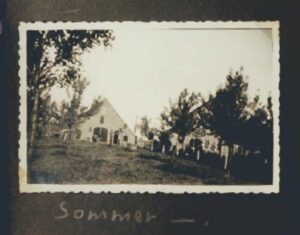
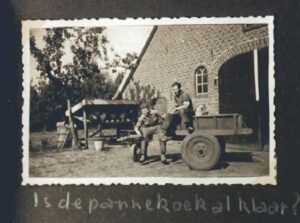 Everyone except Annie has already died. A conversation with daughter Annie Morsink-ter Haar shows that the family still often talked about the pioneers, especially Max and Schraga were often said. Some pioneers visited later, Mother told about it, but she had not always remembered the names. Schraga Engel paid a visit in 1980 and Arie Windmüller (Isaac’s son) also visited them. In 1998 the family took a van to Emden at the unveiling of the Max-Windmüller-Strasse.
Everyone except Annie has already died. A conversation with daughter Annie Morsink-ter Haar shows that the family still often talked about the pioneers, especially Max and Schraga were often said. Some pioneers visited later, Mother told about it, but she had not always remembered the names. Schraga Engel paid a visit in 1980 and Arie Windmüller (Isaac’s son) also visited them. In 1998 the family took a van to Emden at the unveiling of the Max-Windmüller-Strasse.
One of Max’s letters to Willem ter Haar
Groningen 3 sept. 1939
You will be surprised to know me here in Groningen. It has only been for a moment! I don’t know how later the train connections are, so I am now at home for 2 days. My mother was not well, but now I’m fine. I will return to Hengelo as soon as possible. The oats and hay came in nicely without rain. Everything goes as usual, you don’t have to worry about anything. I will discuss everything with Barend Jan and the others. Frans wants to go to another farmer as soon as the situation changes. (You don’t have to say I’m writing you this!) I’ll get you through this time, at least if nothing comes in between. You already know that Vera * is gone, don’t you? But we can manage. Tell me what to do if Sannie is in heat? Willem how are you? I hope you have empathized already! I don’t know any news at the moment! When there is something special, I will keep you informed. I’ll be back at your farm tomorrow. * Vera was a horse and Willem was then called up for the mobilization and was in Woudrichem.
Greetings from your loyal friend Max!
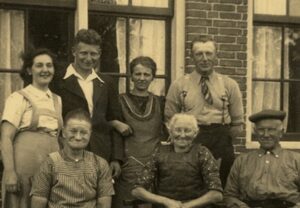
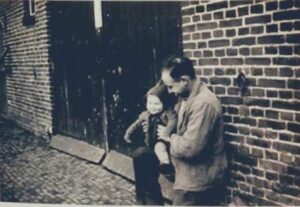 On the left photo above fltr. Klara Rothenberg, Schraga Engel, Gerda and Willem. Under pred. father Berend, his wife Johanna and his disabled sister Johanna. On the right photo Max Windmüller with little Annie.
On the left photo above fltr. Klara Rothenberg, Schraga Engel, Gerda and Willem. Under pred. father Berend, his wife Johanna and his disabled sister Johanna. On the right photo Max Windmüller with little Annie.
Just a brief explanation about the pioneers
In 1918 the vocational training for Palestine pioneers, the Deventer Association, was founded, where hundreds of pioneers from the Netherlands and abroad received their training in the pre-war years. Young people who, by following an agricultural education, prepared for migration to what was then Palestine, which has been split into Palestine and Israel since 1948. Building a Jewish state in Palestine was seen by the Jewish youth as the only answer to the growing anti-Semitism in Europe. The preparation, called hachshara, was necessary to learn skills needed in the unexplored territory. The training was also a requirement to obtain a British immigration visa, a so-called Palestine certificate. There was a separate training program for young pioneers, the youth aliyah, at the Vondelhof in Amsterdam and later in the Loosdrechtse Rade.
Agricultural training centers included the Zeijerveld near Assen and the Wieringermeer working village near Nieuwesluis. In Deventer, the Jewish refugees were initially received in a building of the Teuge flight school. From here they were usually housed in Gelderland and Twente for a work address. In between two work addresses, they often stayed in the association building at Brink 70, later in ‘De Korenbloem’ at Papenstraat 45 in Deventer. The pioneers from this region met every fortnight in Hengelo, among others. Refugee policy was tightened up considerably after 1933. This policy was motivated by the fear that, in the prevailing crisis, an excessive influx of newcomers would damage the economic interests of the indigenous population and increase the problem of unemployment. Public finances were also not allowed to be burdened with the costs for impoverished foreign nationals. For the pioneers, the entry policy was somewhat easier as they were expected to reside here only temporarily and the cost of maintenance was partly borne by the Jewish community. Some of them later joined the Westerweel group. This resistance group, consisting of Jews and non-Jews, set up an extensive network in 1942 to accommodate people in hiding and to organize escape routes. The Jewish participants were mainly Palestine pioneers. Members of the Deventer Association fully participated, see also the story of Max Windmüller. Many men have the name Israel and the women Sarah. This is a German measure of 17 August 1938. In this way it became immediately clear to every official that he was dealing with a Jew.
A total of thirty-six Palestine pioneers worked as agricultural laborers in the municipality of Weerselo. Most of them at addresses in Hasselo, and also in Deurningen, Gammelke and Klein Driene. With the exception of Klein Driene, they were all housed with Dutch Reformed farmers. One of these pioneers even got married in Weerselo.
- Born 03-06-1920 in Wuppertal-Elberfeld, Germany.
- Deceased 31-03-1944 in Auschwitz, Poland.
- Parents Salomon Moser and Jenny Heidt.
- Married to Ruth Liemann.
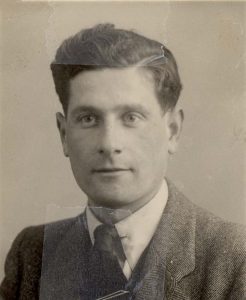 He stayed from 10 September 1941 until probably the end of August 1942 with the Sanderman family at the Leuvelt farm in Hasselo no. 5. This farm is still located on Bartelinkslaantje in what is now Hengelo and is now a care farm.
He stayed from 10 September 1941 until probably the end of August 1942 with the Sanderman family at the Leuvelt farm in Hasselo no. 5. This farm is still located on Bartelinkslaantje in what is now Hengelo and is now a care farm.
Kurt Erich was born in Elberfeld near Wuppertal in a family with three children. At the beginning of November 1938 he came from Turin to the agricultural training center de Wieringermeer. His brother Hans was also here. In 1934 an agricultural training center was set up near the village of Nieuwesluis to receive German refugees between the ages of 18 and 24. Officially it was called: Werkdorp of the Jewish Labor Foundation. The village was given the status of a hachshara institution, which gave the students the opportunity to emigrate to Palestine after their education. The Werkdorp was closed in 1941 by order of the occupier. Some of the residents were arrested during a major raid in Amsterdam and deported to Mauthausen. Other former workers in the village participated in the resistance activities of the so-called Westerweel group.
Kurt Erich stayed for a month in ‘De Korenbloem’, a reception address of the Deventer Association on the Papenstraat and subsequently joined the Sanderman family in September 1941 as a farmer’s apprentice. He married Ruth Sara Lieman on 11-08-1942 in Weerselo. Born February 16, 1923 in Berlin. His parents could not give permission, as they could not be found by then. Both parents died in the extermination camp in Minsk. A dispensation from promulgation and waiting time was granted by decision of the Almelo Justice. Witnesses to the marriage were father Hendrik Willem Sanderman and his son Hendrik Barend. He probably already knew Ruth from the training in the Wieringermeer and she too stayed temporarily in Deventer.
After their marriage, Kurt Erich and Ruth left for Amsterdam. They had two sons together, Rudi Max Born 1942 and – at Ruth’s hiding place in Velp – Kurt Eric jr. Born 1944. Son Rudi Max, from then on called Reuven, was brought to Cornelis and Isabella as a nine-month-old baby in mid-1943. Pouwer-Ganzevoort in Arnhem. After the war he was picked up by his mother again, which was not easy for Reuven. His foster parents also missed him a lot. Thanks to them he survived the war. His foster parents later sought and found him in Israel, and another one was formed in 1971 close contact with them. In 1975 they were awarded by Yad Vashem for their assistance. Reuven grew up with his uncle Yochanan after his mother’s second marriage.
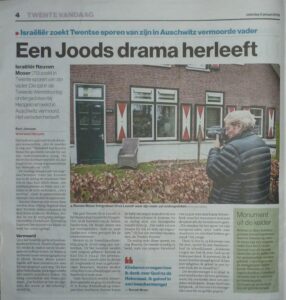 Kurt Erich was arrested in Amsterdam and arrived on 26 August 1943 in camp Westerbork – prison camp 67. On 31 August he was deported to Auschwitz concentration camp. His death certificate was drawn up in Weerselo in 1951. Both children survived the war. Reuven now lives in Israel and Kurt Erich in Denver, Colorado. Ruth Sara Moser-Lieman survived the war and died in Israel in 1954. His brother Yochanan (Hans) and sister Eva also survived the war. Yochanan survived the Bergen-Belsen concentration camp and Eva left for England with the last child transport. Kurt Erich is mentioned on the monument to the victims of the Nazi regime in Wuppertal. In January 2018, Reuven Moser and his wife visited Weerselo and the War Victims Memorial Dinkelland.
Kurt Erich was arrested in Amsterdam and arrived on 26 August 1943 in camp Westerbork – prison camp 67. On 31 August he was deported to Auschwitz concentration camp. His death certificate was drawn up in Weerselo in 1951. Both children survived the war. Reuven now lives in Israel and Kurt Erich in Denver, Colorado. Ruth Sara Moser-Lieman survived the war and died in Israel in 1954. His brother Yochanan (Hans) and sister Eva also survived the war. Yochanan survived the Bergen-Belsen concentration camp and Eva left for England with the last child transport. Kurt Erich is mentioned on the monument to the victims of the Nazi regime in Wuppertal. In January 2018, Reuven Moser and his wife visited Weerselo and the War Victims Memorial Dinkelland.
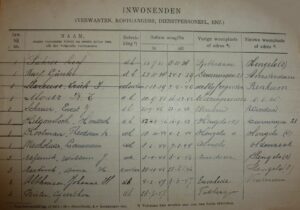 Further pioneers at Hasselo no. 5
Further pioneers at Hasselo no. 5
Russ, Günter
- Born 21-06-1914 in Berlin-Schöneberg, Germany.
- He survived the war.
- Parents Moritz Russ and Jettel Kaiser.
He stayed here from November 23, 1938 to February 24, 1939, after which he moved to Weesperstraat 2 in Amsterdam. This is where the building of the association support for migrants ‘Hagnosas Ourechiem’ was located. Support was provided to Jews who emigrated via Amsterdam. Günter left for Palestine in mid-July 1939 with the ship the ‘Dora’.
Before coming to this address, Günter lived at two other addresses in the municipality of Weerselo, namely Hasselo no. 42 and Deurningen no. 21. Günter was a pioneer of the Deventer Association. In January 1937 he lived for a short time, together with Walter Münzer, in the association building at Brink 70 in Deventer. His father died in Berlin in 1941. His mother was gassed in the extermination chamber Chelmno (Kulmhof).
Nattenheimer, Kurt
- Born 04-08-1920 in Hamburg, Germany. –
- Deceased 00-10-1991 in Israël.
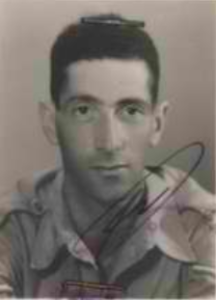 Parents Siegfried Nattenheimer and Erna Speyer.
Parents Siegfried Nattenheimer and Erna Speyer.- Married to Gerda Gila Sophie Lipper.
He stayed here until the end of June 1939, it is not known exactly when he came here. He was a pioneer of the Deventer Association.
Kurt came from Hamburg. After the Nazis came to power, he decided to emigrate to Palestine and joined the Habonim youth group. He later joined the Hachshara in Elgut in Upper Silesia. During Reichskristallnacht the men were transferred to Camp Buchenwald. After their release, they said goodbye at home and all members of the Elgut group gathered in Bielefeld. From there, accompanied by two Gestapo officials, they traveled to the border with the Netherlands.
In July 1939 he left for Palestine on the ship ‘Dora’. There he joined the Jewish-Israeli Police Brigade. He served in Libya, Italy, the Netherlands and Germany, where he helped Jewish refugees illegally emigrate to Palestine at the end of the war. In May 1946 he returned to his friends in Palestine, who had meanwhile founded Kibbutz Gal’ed. He married Gerda Gila Sophie Lipper and continued to live in Kibbutz Gal’ed. In the 1950s he started setting up a herd of beef cattle here. In 1970 he was asked by the Ministry of Agriculture to establish cattle herds on the Golan Heights, which he did for almost 15 years. He then returned to Kibbutz Gal’ed where he died in 1991. His surname was also written as Netta. His parents emigrated to Chicago in 1939, where his father died in 1942.
- Marcuse, Erich–
- Born 26-01-1921 in Greifenhagen in Pommern, Germany.
- Deceased 25-01-1943 in Auschwitz, Poland.
- Parents Julius Marcuse and Wally Israelski
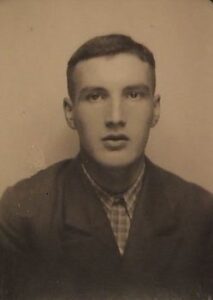 He stayed here from June 24, 1939 to April 5, 1940, after which he moved to Benedendorpsweg no.280 in Renkum. Erich arrived in January 1939 from Bielefeld via the Teuge flight school to the Netherlands. He was a pioneer of the Deventer Association. He first spent almost three months in youth hostel ‘De Kleine Haar’ in Gorssel, a branch of the Deventer Association for foreign refugees.
He stayed here from June 24, 1939 to April 5, 1940, after which he moved to Benedendorpsweg no.280 in Renkum. Erich arrived in January 1939 from Bielefeld via the Teuge flight school to the Netherlands. He was a pioneer of the Deventer Association. He first spent almost three months in youth hostel ‘De Kleine Haar’ in Gorssel, a branch of the Deventer Association for foreign refugees.
In 1943 he was in the Central Israelite Insane asylum Het Apeldoornsche Bos at Zutphensestraat no. 106 in Apeldoorn. He was probably one of many Jewish volunteers who came here after they were forced by the occupying forces to fire all non-Jewish employees in 1942. On January 22, 1943, more than a thousand people were deported from here to the Auschwitz II-Birkenau extermination camp, including Erich. No one from this transport has ever been heard from again. His parents and sister Gertrud were also killed.
At the family Gerrit Huiskes on the ‘Erve Lansink’, the farm was on the current Bartelinkslaantje and was demolished around 1980.
Croner, Helene
- Born 03-01-1919 in Hamburg, Germany.
- Deceased 24 April 1999 in Zelhem.
- Parents Walter Croner and Jenny Meijer.
- Widow from Michiel Asser Benjamin Jacob.
- Married with Johannes Hendrikus Roenhorst.
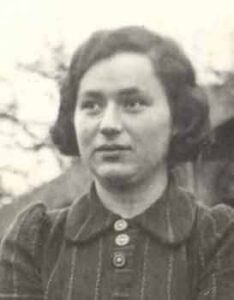 She stayed here from April 6, 1939 to early January 1940. Then she spent a few days in Deventer with Ru Cohen, the founder of the Deventer Association. After this she left for the Klaassen family in Tonden near Brummen. Helene was the sixth of a very poor family with seven children. Her father had already died in 1934. In April 1938 she had joined the pioneer association Gut Jägerslust in Flensburg and left for the Netherlands in March 1939, where she joined the Deventer Association.
She stayed here from April 6, 1939 to early January 1940. Then she spent a few days in Deventer with Ru Cohen, the founder of the Deventer Association. After this she left for the Klaassen family in Tonden near Brummen. Helene was the sixth of a very poor family with seven children. Her father had already died in 1934. In April 1938 she had joined the pioneer association Gut Jägerslust in Flensburg and left for the Netherlands in March 1939, where she joined the Deventer Association.
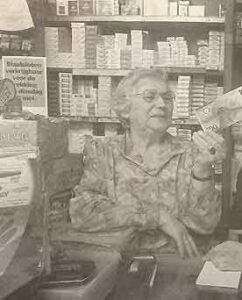 After her stay in Hasselo and Brummen she married Michiel Asser Benjamin Jacob on August 27, 1942. They moved to Zelhem, where they took over his parents’ smoking equipment shop. Her husband was arrested a month after their wedding and died in 1945 after a stay in several camps in Gross Rosen, now Poland. Her mother, her sisters Ruth, Anna and Meta and her brother Leopold were all killed during the Holocaust, as well as her in-laws. Helene and her brothers Herman and Herbert survived the war. Helene later married Johannes Hendrikus (Han) Roenhorst. Together they had son Han. Her husband died in 1997 and Helene in Zelhem in 1999.
After her stay in Hasselo and Brummen she married Michiel Asser Benjamin Jacob on August 27, 1942. They moved to Zelhem, where they took over his parents’ smoking equipment shop. Her husband was arrested a month after their wedding and died in 1945 after a stay in several camps in Gross Rosen, now Poland. Her mother, her sisters Ruth, Anna and Meta and her brother Leopold were all killed during the Holocaust, as well as her in-laws. Helene and her brothers Herman and Herbert survived the war. Helene later married Johannes Hendrikus (Han) Roenhorst. Together they had son Han. Her husband died in 1997 and Helene in Zelhem in 1999.
Rothenberg, Klara Sara
- Born 10-12-1919 in Vienna, Austria.
- She survived the war.
- Parents David Rothenberg and Rachel Grossmann.
- Married in 1945 with Abraham van Praag.
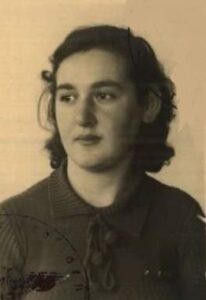 She stayed here from 11 June 1940 to 16 November 1940. Klara came in January 1939 from Karlsruhe to the Deventer Association. Then in the Central Israelite Insane Asylum Het Apeldoornsche Bos, where she worked in the diet kitchen until October 1939. Then she lived until January 1940 with Isaac de Leeuw at Ledeboerslaan no. 2 in Almelo and then at Loenensemarkweg no. 90 in Apeldoorn.
She stayed here from 11 June 1940 to 16 November 1940. Klara came in January 1939 from Karlsruhe to the Deventer Association. Then in the Central Israelite Insane Asylum Het Apeldoornsche Bos, where she worked in the diet kitchen until October 1939. Then she lived until January 1940 with Isaac de Leeuw at Ledeboerslaan no. 2 in Almelo and then at Loenensemarkweg no. 90 in Apeldoorn.
After her stay in Hasselo she left for Tubbergen D345. She obtained her milkers diploma in May 1941 in Albergen. At the beginning of 1943 she worked in the cap manufacturer in Almelo. In the course of 1943, in order to escape deportation, she was admitted to the Catholic St. Elisabeth hospital in Almelo where she was operated on on her tonsils and appendix. She was then placed with the horticultural family Gerrit and Annie Nijhof from Almelo. She then left for Amsterdam. She then went into hiding and worked until mid 1944 as a housekeeper for the Wien family in Wageningen.
She then joined the Westerweel group, her cover name was Jantina Martens. She was later housed with Tieke Jansma, who offered a hiding place to many Jews. Tieke lived in Denekamp as a child. When some people in hiding contracted typhus, they were cared for by Tieke, after which she herself eventually died at the age of 31. After the death of Tieke, at whose funeral Klara was still attending, she remained in hiding with a few others in her house until the liberation in May 1945.
She then left with the brigade for France, from where she left on an English boat for Palestine, together with Anneke Hijmans and Betteke Til. She married fellow pioneer Abraham van Praag in 1945, who also stayed in Hasselo in 1936. She later lived in Moshav Kfar Monash, Israel. Her mother and her brother David and sisters Tini and Judith also survived the war. Her father had already died before the war.
At the ter Haar family on ‘De Koekoek’, this farm on the Hesselder was a short distance north of the Topweg. Max Windmüller also stayed here.
Slijper, Joseph Leo (Joop)
- Born 22-12-1910 in Amsterdam.
- Deceased 12-12-1986 in Tel-Aviv, Israel.
- Parents Lehman Sharpener, broker in securities, and Mietje Asscher.
- Married with Hannah Levy.
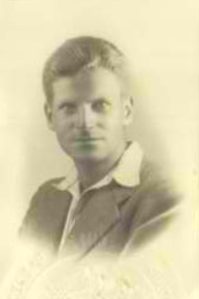 He stayed here from September 26, 1935 to February 3, 1937 and then left for his parents at Banstraat no. 52 in Amsterdam. He was the youngest of their three children. In March 1937 he left for Palestine, only to return to Amsterdam two years later. From November 1939 he worked there as a pedagogue at the Vondelhof. At the time, 70 young people were housed here through the Foundation for Immigration and Education of Children in Palestine, the ‘youth aliyah’. These were Jewish children from Nazi Germany who ended up here as refugees.
He stayed here from September 26, 1935 to February 3, 1937 and then left for his parents at Banstraat no. 52 in Amsterdam. He was the youngest of their three children. In March 1937 he left for Palestine, only to return to Amsterdam two years later. From November 1939 he worked there as a pedagogue at the Vondelhof. At the time, 70 young people were housed here through the Foundation for Immigration and Education of Children in Palestine, the ‘youth aliyah’. These were Jewish children from Nazi Germany who ended up here as refugees.
He later left permanently for Palestine, married Hannah Levy and had two sons. In 1963 he became director of Misrad Hashikoen’s Planning Department. His brother Isaac had already left for Palestine. His father died in Amsterdam in September 1942. His mother and sister Sara with her husband ended up in the Bergen-Belsen concentration camp. Sara and her husband died there. His mother experienced the liberation there, but she was already so weakened that she died in hospital shortly afterwards.
Russ, Günter
He stayed here from February 17, 1937 to September 21, 1937 and then left for Hengelo, Gelderland and in May 1938 to Hummelo. He also stayed at two other addresses in the municipality of Weerselo, namely Hasselo no. 5 and Deurningen no. 21.
Rosenbaum, Martin
- Born 24-06-1907 in Schlüchtern, Germany.
- He survived the war.
- Parents Jacob Rosenbaum and Mali Heismann.
He stayed here from May 28, 1937 to March 9, 1938. Martin lived in Amsterdam since January 1934 and in Rotterdam from June 1935. Until May 1937 he was active there with the Rotterdam Association of Palestine Pioneers. After his stay in Hasselo he emigrated to Palestine. His mother Mali and his brother Ernst lived in Würzburg, they were killed during the Holocaust.
Engel, Ferencz (Schraga)
- Born 07-09-1917 in Parkau, Czechoslovakia.
- Deceased 10-12-1987 in Yokneam, Israel.
- Parents József Engel and Miryam Jólan Baig.
- Married with Winnie Nabarro
He stayed here from May 13, 1938 to October 16, 1939, after which he moved to Bornerbroekschestraat no. 351 in Almelo. Schraga was a pioneer of the Deventer Association. He already knew Max Windmüller from Zeijerveld and from Deventer. Later he was also part of the Westerweel group, just like Max. Schraga stayed from May 1940 to June 1942 together with Max Windmüller, Albert Berger and Harald Simon in Assen. They also worked here in a paper mill. Together with Jaap Spitz, a brother of pioneer David Spitz, plans were made to flee by plane, but these plans failed. In June 1942 he left for Deventer again.
In August 1942 he managed to flee to France. He stayed in Paris for several months, where he again met Jaap Spitz. Jaap decided to return to the Netherlands with another pioneer and was arrested en route, he died in 1943 in the Bergen-Belsen concentration camp. Schraga was arrested in Paris in December 1942 after he was betrayed by the owner of the hotel. He was sent to the French camp of Drancy, on the way from Drancy to Poland he managed to jump from the moving train. Unfortunately he was arrested again shortly afterwards and ended up in camp Auschwitz-Birkenau. As a punitive measure he was sent to the Golleschau auxiliary camp, where he had to do very hard work in a quarry. With the Russians approaching, they were sent on a ‘Death March’ in early 1945 and Schraga ended up in camp Sachsenhausen. From there it went on to Camp Flossenburg, where he worked in the kitchen. Then to Camp Cham, where they were liberated by the Americans on April 23, 1945. Schraga was completely exhausted and was taken to hospital to recover.
He returned to Assen in May 1945 and married Winnie Nabarro in September 1945. They worked for a few more weeks for a Dutch farmer, stayed in France for a few more months and finally arrived in Palestine in April 1946. They founded a farm in Yokneam and had five children together. Schraga died here in 1987 and his wife Winnie in 2011. His mother and brother Mordahai survived the war. His father died in 1944 in the Czech Republic and his mother in Israel in 1950. Schraga came to visit the ter Haar family in 1980.
- Born 28-11-1914 in Amsterdam.
- Deceased 22-01-1943 in Auschwitz, Poland.
- Parents Samuel Jacobs, office clerk, and Bella Reich.
He stayed here from March 27, 1941 to December 1942, at the same time as Rolf Rothmann. Both have probably left earlier and went into hiding. Max Windmüller had left this address one day before his arrival. Siegfried lived with his parents and brother in Amsterdam until the early 1930s. The family then moved to The Hague, where his mother died in November 1936. A year later they moved to Choorstraat no. 30 in Utrecht and in November 1939 to Van Limburg Stirumstraat no. 80 in The Hague. Siegfried stayed from January 1940 to September 1940 at no. 141 in Almen near Gorssel. After that he lived again with his father and brother in The Hague. In February 1941 he left for Achterhoekschedwarsweg no. 7 in Hengelo and then to Hasselo.
His search was requested in September 1942. Here is the report from the Algemeen Politieblad: “The Mayor of Weerselo requests that Siegfried Jacobs, a farmer’s servant, residing in the Hasselo 42 district of Weerselo, be located, detained and brought to trial. He is suspected of having changed his place of residence without the required permit. obtained.” This description referred to Jews who had gone into hiding. He was arrested and arrived in camp Westerbork on September 30, 1942. He was deported on November 6 to Auschwitz concentration camp, where he died. His brother Frits was head teacher of religion. He was married in August 1942, a month later both arrived, together with his father, in Westerbork transit camp. They were all killed in camp Auschwitz.
Rothmann, Herbert Rolf
- Born 18-03-1921 in Berlin, Germany.
- Deceased in 1945 in Palestine.
- Parents Ernst Eisig Rothmann and Charlotta Joseph.
He stayed here from April 8, 1941 to January 6, 1943, during the same period as Siegfried Jacobs. Both have probably left earlier and went into hiding. Rolf came to the Netherlands in March 1939. Since May 1937 he stayed with Hans Eisner and Werner Hirschfeld at Gut Winkel in Spreenhagen and arrived here at the same time as Teuge airfield. In April 1939 he left to no. A 157 in Hummelo, in October 1939 to no. C 51 in Hoog-Keppel and then in February 1940 to Brinkweg no. 32 in Rheden. He was also a pioneer of the Deventer Association.
In Hengelo he came into contact with Herman Smies and Hennie Smies-Vallinga, who were members of the teetotaler union and were also socialists. Hennie helped Rolf across the border near Tilburg, after which he went via Belgium and France – with the help of Max Windmüller – and a tough trip across the Pyrenees, together with Emil Windmüller and Werner Hirschfeld, finally in November 1944 with the ‘Guinea’. arrived in Palestine. He then used the cover name ‘Robert Vallinga’. He died in Palestine in 1945 after a short but severe illness. His father died in the Warsaw ghetto.
Rath, Simon
- Born 31-08-1919 in Stanislav, Russia.
- Deceased in 2010 in Omer, Israel.
- Parents Nathan Rath, manager, and Mina Stopper.
- Married with Deborah Schönfeld.
He stayed here from June 30, 1937 to February 28, 1938. He came here from Amsterdam, where the family had moved from Bochum, Germany, in 1921. After his stay in Hasselo he left for the H. J. Harmsen family in Brummen. and a year later to Heemskerk. Plumber was mentioned as a profession.
He left in July 1939 with the ship ‘Dora’ for Palestine. He married Deborah Schönfeld there. Together they had two children. His parents and brother Gerchon also survived the war. His brother Rubin was killed in concentration camp Sobibor, his sister Erna and her family died in camp Auschwitz.
Mühlrad, David
- Born 03-04-1915 in Vienna, Austria.
- Deceased in 1989 in Israël.
- Parents Jacob Mühlrad, cinema owner, and Leie Flank.
- Married in 1952 with Elisabeth van Crefeld-van Buuren.
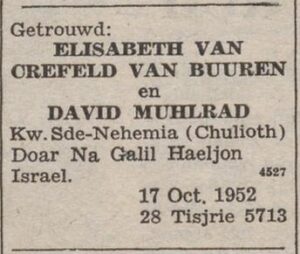 He stayed here, coming from Rotterdam, from October 24, 1940 to May 6, 1941. Then he left for Hasselo no. 54. The family had lived in Amsterdam since the beginning of 1916 and since 1918 in Rotterdam, where his mother died in November 1918. His father was director of several cinemas here. He married Fanny Rosenzweig in 1920 and had children Max and Lotte with her. His father died in Leiden in 1934. They had the Dutch nationality since 1925. David lived in Lonneker for a short time in 1930.
He stayed here, coming from Rotterdam, from October 24, 1940 to May 6, 1941. Then he left for Hasselo no. 54. The family had lived in Amsterdam since the beginning of 1916 and since 1918 in Rotterdam, where his mother died in November 1918. His father was director of several cinemas here. He married Fanny Rosenzweig in 1920 and had children Max and Lotte with her. His father died in Leiden in 1934. They had the Dutch nationality since 1925. David lived in Lonneker for a short time in 1930.
After his stay in Hasselo he managed to flee to free Switzerland, where he arrived in February 1943. Then he left for Israel. David married Elisabeth van Buuren there in October 1952, when he lived in Doar Na Galil Haeljon Elisabeth was the widow of Israel van Crefeld, who died in Sobibor, and was the mother of a daughter. David died in Israel in 1989 and his wife in 2010. His brother Izio also survived the war and fled to Buenos Aires in 1937. His stepmother Fanny was killed in concentration camp Sobibor and his half-brother Max and half-sister Lottie were killed in camp Auschwitz.
Rajzenstadt/Reisenstadt, Hirsch Schija (Heinrich)
- Born 28-07-1922 in Essen, Germany.
- Deceased 08-10-2003 in Argentina.
- Parents Gustav/Godel Rajzenstadt, tanner, and Bertha Finkelstein.
- Married in 1945 with Getwa Clara Looije.
He stayed here from May 5, 1941 to January 8, 1942. His father had lived in Amsterdam since August 1938, his mother died in October 1938 in Essen, Germany. In February 1939 his father sent a letter to the Ministry. In it he wrote about his son Hirsch, who, after a stay in a concentration camp, had received permission from the authorities to come to the Netherlands and had stayed here since December 1938. In the meantime, he had been in quarantine in Rotterdam for three weeks and then received in youth hostel ‘De Kleine Haar’ in Gorssel, a branch of the Deventer Association for foreign refugees. He would now like to receive permission to bring this son to Amsterdam as a caring widower of already two children.
Hirsch lived from June 1939 to February 1940 in the municipal orphanage at Spieringstraat no. 1 in Gouda. Many German Jewish refugee children were housed here. Then he left for his father in Amsterdam. From April to June 1940 he stayed at Diepesteeg no. 23 in De Steeg near Rheden, then three months in the hamlet of Covik in Steenderen and then returned to the farm on Diepesteeg. in May 1941 he came to Hasselo. In January 1942 he left for Amsterdam again. His father had remarried there in 1942 to Regina Kahn. The family was working on an “Albersheim Declaration” from the emigration service. A medical certificate proving physical fitness for the pioneer work. This will no longer be successful.
Hirch survived the war and married Getwa Clara Looije in 1945 in Bussum. His surname was later written as Reisenstadt. They had two children and moved to Capivara, Argentina in 1954 and later to Amsterdam. He eventually passed away in Argentina in 2003. His wife died in 2014. His father and stepmother were killed in the concentration camp Sobibor. His sister Maria and brother Abraham survived the war.
At the Snuverink-Hammink family near the farm ‘De Bongerd’. Nowadays the new housing estate of Borne near the sde traten Lover and Rozenhof.
Misch, Peter Salomon
- Born 22-04-1915 in Berlin-Wittenau, Germany.
- Deceased 07-08-2005 in Israel.
- Parents Willy Misch and Elsebeth Kinsky.
- Married in 1942 with Charlotte Ebel, divorce.
- Married with Margot Pinkus, divorce.
- Married with Annemarie Goldschmidt-Poser.
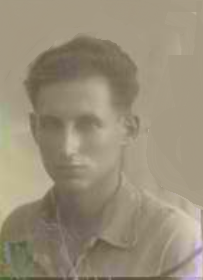 He stayed here from November 24, 1938 to May 12, 1939. In 1935-1936 he was a farmhand in the municipality of Borne. In June 1936 he left for no. C 60 in Hoog-Keppel, in November 1937 to no. A 32 in the neighborhood of the Stapel near De Wijk and in May 1938 to no. T 27 in Nijbroek near Voorst. After his stay in Hasselo, he left for youth hostel ‘De Assumburg’ at Tolweg no. 9 in Heemskerk.
He stayed here from November 24, 1938 to May 12, 1939. In 1935-1936 he was a farmhand in the municipality of Borne. In June 1936 he left for no. C 60 in Hoog-Keppel, in November 1937 to no. A 32 in the neighborhood of the Stapel near De Wijk and in May 1938 to no. T 27 in Nijbroek near Voorst. After his stay in Hasselo, he left for youth hostel ‘De Assumburg’ at Tolweg no. 9 in Heemskerk.
He married Charlotte Ebel from Beuthen and left with her for Palestine in June 1939. She was a sister of Palestine pioneer Siegismund Ebel. Divorce followed in June 1942, after which he married Margot Pinkus. Later he was married to the widow Annemarie Goldschmidt-Poser, she died in 1994. Together with them he had five children / stepchildren. His mother died in Auschwitz concentration camp in 1942. His father Willi and twin brother Klaus fled to England and his brother Bernard to Sao Paulo. His sisters Susanne and Lore probably also survived.
Prinz, Leonhard
- Born 25-12-1919 in Allenstein, Germany now Poland.
- He survived the war.
- Parents Ernst Prinz, merchant, and Rahel Blumenthal.
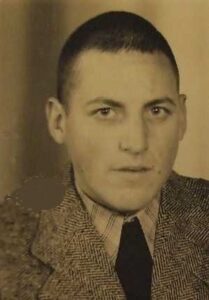 He stayed here from January 11, 1939 to February 8, 1940. Leonhard arrived in January 1939 from Bielefeld via the flight school Teuge in the Netherlands. He was a pioneer of the Deventer Association. After Hasselo he left for no. G 82 in Brummen and shortly afterwards to Deventer. He lived there in the Beth Chaloets house ‘De Korenbloem’ on the Papenstraat. This house was managed by the Deventer Association for vocational training for Palestine pioneers.
He stayed here from January 11, 1939 to February 8, 1940. Leonhard arrived in January 1939 from Bielefeld via the flight school Teuge in the Netherlands. He was a pioneer of the Deventer Association. After Hasselo he left for no. G 82 in Brummen and shortly afterwards to Deventer. He lived there in the Beth Chaloets house ‘De Korenbloem’ on the Papenstraat. This house was managed by the Deventer Association for vocational training for Palestine pioneers.
In September 1942, the police commissioner of Deventer requested his search and arrest, so he was apparently in hiding. It is not known when he arrived at camp Westerbork, but on 6 November 1942 he was deported from Westerbork to Auschwitz concentration camp. He was transported to the Bergen-Belsen concentration camp on March 15, 1944. It was assumed that he would have died there on May 31, 1945. But according to the Holocaust Survivors and Victims Database, he was liberated from Bergen-Belsen concentration camp. His mother died in June 1942, probably in Allenstein. More is not known about the family.
Mühlrad, David
He stayed here, coming from Hasselo no. 46, from May 6, 1941 to December 16, 1942. See his story there.
Verliebter, David
- Born 21-04-1921 in The Hague.
- Deceased 16-02-2003 in New York, USA.
- Parents Jacob Verliebter, merchant, and Rosa Sleyen.
- Married in 1964 with Mireille Rebecca Leon.
He stayed here from April 22, 1941 to January 20, 1942. David came at the end of March 1941 from The Hague to Haaksbergerweg no. 100 in Hengelo and a month later as a farmhand to Hasselo. At the end of January 1942 David moved back to his parents at Paulinastraat no. 40 in The Hague. They had come to The Hague from Ukraine via Vienna around 1920.
In the same year David left for Belgium. His parents and sister, along with many others, went into hiding at 19 Reinkenstraat in The Hague. At the end of March 1943, 24 people, including his parents, were arrested after betrayal. They were killed in the Sobibor concentration camp. David was still able to save the life of his sister Deborah from Belgium when she wanted to leave her hiding place in The Hague earlier. David arrived in Switzerland in September 1943. He emigrated from Munich to the United States in 1950. He will have returned later, as he married Egyptian-born Mireille Rebecca Leon in January 1964. She moved to Amsterdam with her mother in 1957. David and Mireille also lived in Amsterdam, but Mireille died in May 1966 in Munich. David later went back to New York. where he died in 2003. Whether he later married again is unknown.
At the Jan Lambertus Snuverink family on the farm ‘De Bongerd’. The farm was located approximately 500 m. West-southwest from restaurant Boomkamp, nowadays the new housing development of Borne near the streets Lover and Rozenhof.
Eiger, Horst
- Born 01-04-1914 in Lötzen, Germany.
- He survived the war.
- Parents unknown.
- Married with Dyna Goldberg.
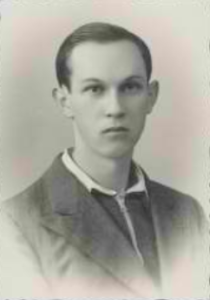 He stayed here, coming from Lonneker, from September 30, 1933 and was officially written off in November 1937 with the remark: probably to Romania.
He stayed here, coming from Lonneker, from September 30, 1933 and was officially written off in November 1937 with the remark: probably to Romania.
He left for Palestine in 1938 with his wife Dyna Goldberg. Photographer was listed as a profession. They lived in Haifa. Nothing is known about his family, he may have had a sister Else, who also survived. It is not certain whether he was one of the pioneers.
Praag van, Abraham
- Born 11-01-1910 in Amsterdam.
- He survived the war.
- Parents Joel van Praag, cigar maker, and Sophia Pepper.
- Married in 1936 with Henriëtte Baars, divorce.
- Married in 1945 with Klara Rothenberg.
He stayed here from June 24, 1936 to November 11, 1936. Abraham came in August 1934 from his parental home in Amsterdam to no. D 87 in Voorst, he was a pioneer of the Deventer Association. He married Henriëtte Baars from Amsterdam at the end of August 1936 in Hellendoorn.
After his stay in Hasselo, they left for Palestine together. Their daughter was born in March 1938. Their marriage was dissolved in Hellendoorn in October 1945. Apparently it took a long time for this divorce to be finalized, because Henriëtte already had a child from her later husband in 1943. Abraham then married fellow pioneer Klara Rothenberg, who stayed with the Huiskes family at Hasselo No. 7 in 1940. They later lived in Moshav Kfar Monash, Israel. A child was also born from this marriage. His parents and his brother Arnold with his wife died in the Sobibor concentration camp.
Weinberg, Willi
- Born 21-09-1911 in Oelde, Germany.
- Deceased 17-03-1987 in Beit Yitzhak, Israël.
- Parents Josef Weinberg, tailor, and Berta Lippe.
- Married in 1938 with Margarete Grünebaum.
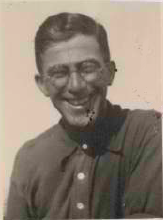 He stayed here from October 24, 1936 to July 17, 1937. Willi came here from Lange Strasse no. 13 in Oelde. He left for Huize Middelbeek near Twello, municipality of Voorst. His brother Erich also regularly stayed in Voorst as a representative of the pioneers. Willi’s last address was no. M 62 in Twello.
He stayed here from October 24, 1936 to July 17, 1937. Willi came here from Lange Strasse no. 13 in Oelde. He left for Huize Middelbeek near Twello, municipality of Voorst. His brother Erich also regularly stayed in Voorst as a representative of the pioneers. Willi’s last address was no. M 62 in Twello.
Willi married Margarete Grünebaum in Amsterdam in January 1938. In March 1938 they left for Palestine, where a child was born in 1940. They later lived in Beit Yitszhak near Netanya, where Willi died in 1987 and his wife in 2006. His brother Erich also left for Palestine in time. His mother died in 1940 in Oelde and was the last buried there in the Jewish cemetery.
Leefsma, Eduard
- Born 31-05-1917 in The Hague.
- Deceased 28-01-2009 in Yokne’am, Israël.
- Parents Mozes Leefsma, commercial agent, and Marianne Snijders.
- Married in 1947 with Clara Helena Leefsma.
He stayed here from June 6, 1938 to February 1, 1939. Eduard came from the hamlet of Rande no. 230 near Diepenveen to Hasselo. Then he left for the Smit family in Zenderen. Of the more than 30 pioneers who lived in the Borne Congregation, ten stayed at this address over the years. He lived in The Hague in 1927, after which the family moved to Amsterdam. Eddy passed the 2-year agricultural course at Zenderen in April 1939.
Then he left for youth hostel ‘De Assumburg’ at Tolweg no. 9 in Heemskerk. He left for Palestine in mid-July 1939 with the ship ‘Dora’. He married there in 1947 the widow Clara Helena Goldschmidt-Leefsma. They were married in Westerbork transit camp in November 1943. Her husband is in the Bergen-Belsen concentration camp in April 1945, just before a planned exchange with Germans in Palestine. perished. Eddy and Clara had two children together. His parents, sister Ella with her husband and brothers Raphaël and Frits all died in concentration camp Sobibor.
- Born 17-10-1920 in Bielefeld, Germany.
- Deceased 31-03-1944 in Auschwitz, Poland.
- Parents Georg Simon and Johanna Humberg.
- Married in 1942 with Meta Cohen.
He stayed here from January 7, 1939 to October 30, 1939. He was a pioneer of the Deventer association. At the end of December 1938 he had come from Bielefeld to Deventer, where he lived in the association building at Brink no. 70. From here he left for Hasselo and then to Oude Venderinksweg no. 74 in Hengelo. In April 1941 he left for Rolderstraat no. 54 in Assen.
Harald was an only child. In September 1942 he married Meta Cohen, another Palestine pioneer. He appears to have been married before to Miriam Isak, who died in a concentration camp. After their marriage, Harald and Meta lived with her parents at 69 Oosterparallelweg in Assen. Together with Meta he tried to escape deportation by going into hiding, but this failed. Harald was arrested in Rotterdam and taken to Westerbork transit camp on 19 October 1943, as was Meta. Both were deported the same day to Auschwitz concentration camp, where Meta was killed shortly after arrival. His parents survived the war and later died in Sao Paulo, Brazil.
At the Gerhardus Leuveld family nicknamed ‘de Kogelboer’, at the crossing Bornsedijk-Hesselerweg, now the municipality of Borne.
Münzer, Walter
- Born 28-04-1912 in Berlin, Germany.
- He survived the war.
- Parents Berhard Münzer, merchant, and Henriette Lachotski.
He stayed here from February 3, 1937 to February 18, 1939. Walter came to the Netherlands from Berlin. He was a pioneer of the Deventer Association and stayed in the association building at Brink no. 70 before he came to Hasselo.
After his stay in Hasselo, he left for youth hostel ‘De Assumburg’ in Heemskerk. In mid-July 1939 he left for Palestine with the ship the ‘Dora’. His parents died in Auschwitz concentration camp.
- Born 12-06-1922 in Göttingen, Germany.
- Deceased 30-09-1942 in Auschwitz, Poland.
- Parents Siegfried Meijerstein, cattle dealer, and Rosa Gans.
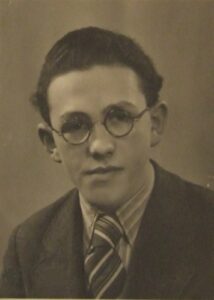
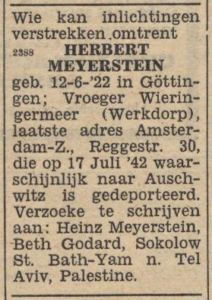 Herbert stayed here from the end of June 1939 to January 19, 1940. Then he left for Brummen. He was the youngest of a family with two sons. After his brother Heinz had previously fled to the Netherlands, Herbert also left for the Netherlands in June 1939. He was a Palestine pioneer of the Deventer Association. After his stay in Hasselo he left for Oeken E 93 near Brummen. At the end of March 1940 he came as a pioneer in the working village of the Wieringermeer. Later he lived in Amsterdam, where he was arrested. His brother Heinz also stayed as a pioneer in Deventer and the Wieringermeer.
Herbert stayed here from the end of June 1939 to January 19, 1940. Then he left for Brummen. He was the youngest of a family with two sons. After his brother Heinz had previously fled to the Netherlands, Herbert also left for the Netherlands in June 1939. He was a Palestine pioneer of the Deventer Association. After his stay in Hasselo he left for Oeken E 93 near Brummen. At the end of March 1940 he came as a pioneer in the working village of the Wieringermeer. Later he lived in Amsterdam, where he was arrested. His brother Heinz also stayed as a pioneer in Deventer and the Wieringermeer.
Herbert was transported to Auschwitz concentration camp via camp Westerbork on 15 July 1942. His parents also became victims of the Holocaust. His brother Heinz left the Netherlands for Palestine on time and survived the war.
Lesser, Siegmund Theodor
- Born 04-08-1916 in Beuthen, Germany now Poland.
- Deceased 04-07-1990 in Kibbutz Gvaram, Israel.
- Parents Hugo Lesser, timber merchant, and Herta Goldstein.
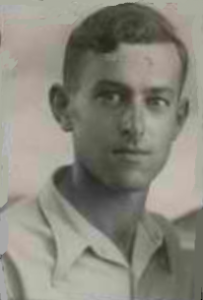 He stayed here, coming from Bussum, from August 29, 1934 to August 24, 1936. Then he left for his parents at Albrecht Durerstraat 27 in Amsterdam. He was very active in the Dutch Pioneers Association. He later emigrated to Israel and from then on called himself Shmuel Lesser. He married there and had two children. His father was killed in the Holocaust. His mother, brother Wolfgang and sisters Charlotte and Eva survived the war.
He stayed here, coming from Bussum, from August 29, 1934 to August 24, 1936. Then he left for his parents at Albrecht Durerstraat 27 in Amsterdam. He was very active in the Dutch Pioneers Association. He later emigrated to Israel and from then on called himself Shmuel Lesser. He married there and had two children. His father was killed in the Holocaust. His mother, brother Wolfgang and sisters Charlotte and Eva survived the war.
Sondheimer, Ewald
- Born 16-08-1919 in Neuhof-Fulda, Germany.
- Deceased 21-11-1996 in Beit Yitzchak, Israel.
- Parents Nathan Sondheimer, merchant, and Lina Sommer.
- Married with Hava Eva Levy.
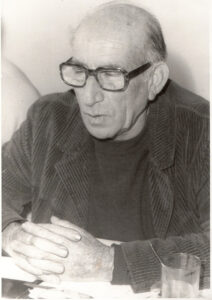 He stayed here from October 24, 1936 to April 12, 1938. Ewald was a pioneer of the Deventer Association. He was the youngest of a family with three children. The family moved to Hünfeld in 1929 and to Kassel in May 1933. Ewald came to the Netherlands in 1936, the rest of the family followed a year later. He then came to Deurningen as a farmer in October 1936 and then moved to the association building at Brink 70 in Deventer. He became very active in the Hachshara movement. His parents and sister Elli emigrated to Brazil in February 1939. Ewald, who wanted to go to Palestine, and sister Liesel, who was married in Amsterdam, decided to stay in the Netherlands. He lived among others in the ‘youth aliyah’ de Vondelhof in Amsterdam. In November 1939, 70 young people were housed here through the Foundation for Immigration and Education of Children in Palestine, the ‘youth aliyah’. These were Jewish children from Nazi Germany who ended up here as refugees.
He stayed here from October 24, 1936 to April 12, 1938. Ewald was a pioneer of the Deventer Association. He was the youngest of a family with three children. The family moved to Hünfeld in 1929 and to Kassel in May 1933. Ewald came to the Netherlands in 1936, the rest of the family followed a year later. He then came to Deurningen as a farmer in October 1936 and then moved to the association building at Brink 70 in Deventer. He became very active in the Hachshara movement. His parents and sister Elli emigrated to Brazil in February 1939. Ewald, who wanted to go to Palestine, and sister Liesel, who was married in Amsterdam, decided to stay in the Netherlands. He lived among others in the ‘youth aliyah’ de Vondelhof in Amsterdam. In November 1939, 70 young people were housed here through the Foundation for Immigration and Education of Children in Palestine, the ‘youth aliyah’. These were Jewish children from Nazi Germany who ended up here as refugees.
Attempts to obtain an English visa failed, and in mid-July 1939 he left for Palestine with the ship ‘Dora’. Ewald, who from then on called himself Shomo, founded a new kibbutz with other Dora pioneers. Here he lived with his wife Hava Eva Levy, whom he knew from the Netherlands and with whom he married in Palestine. After a few years they left for Emek Hefer, where they started their own farming business. Their two children were also born here. Their farming business became a great success and an example to many others. He became active in politics and later a leading person in the contacts between German agricultural organizations and Emek Hefer. After being diagnosed with cancer in 1990, he took his family on a farewell tour through his native Germany, after which he died in Israel in 1996 and was buried there. His mother Lina left for Israel in 1952 after her husband’s death and went to live with Ewald. Sister Liesel Wijnman and her family were killed during the Holocaust. Sister Elli survived and moved again with her family to Germany in 1957.
Ebel, Sigismund
- Born on 28-07-1915 in Beuthen, Germany now Poland.
- He survived the war.
- Parents Emil Ebel, insurance agent, and Else Goldstein.
He stayed here from November 11, 1936 to May 12, 1938. Sigismund came to Deurningen from London. He left for the association building at Brink no. 70 in Deventer. Two weeks later he left for nr. C 161a in Voorst and in February 1939 to youth hostel ‘De Assumburg’ at Tolweg no. 9 in Heemskerk. Since May 1939 he lived in Amsterdam, where he worked in the ‘youth aliyah’ de Vondelhof. In November 1939, 70 young people were housed here through the Foundation for Immigration and Education of Children in Palestine, the ‘youth aliyah’. These were Jewish children from Nazi Germany who ended up here as refugees.
In July 1939 he left for Palestine with the ‘Dora’. His sister Charlotte had been married to Palestine pioneer Peter Misch for several years. His father and his brothers and sisters Charlotte, Käthe, Rudi and Bernard all survived the war. When his mother died in unknown.
- Born 15-04-1918 in Hilversum.
- Deceased 30-09-1942 in Central Europe.
- Parents Elias Spitz, diamond knot, and Rachel Rabbit.
- Married in 1942 with Marcella de Vries.
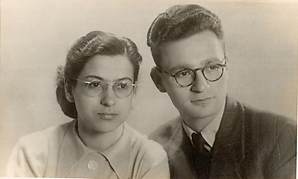 He stayed here from May 19, 1938 to March 3, 1939. Then he left for Amsterdam. David was a pioneer of the Deventer Association. He was the youngest of five sons, his mother had already died in 1921. He previously stayed in Voorst and since the end of April 1937 with the van Enst family at Vinkweg no. 17 in Bergh. In October 1939 he lived at Zwarteweg no. B 103c in Voorst.
He stayed here from May 19, 1938 to March 3, 1939. Then he left for Amsterdam. David was a pioneer of the Deventer Association. He was the youngest of five sons, his mother had already died in 1921. He previously stayed in Voorst and since the end of April 1937 with the van Enst family at Vinkweg no. 17 in Bergh. In October 1939 he lived at Zwarteweg no. B 103c in Voorst.
After his departure from Deurningen he worked in Amsterdam as a gardener at the ‘youth aliyah’ de Vondelhof. In November 1939, 70 young people were housed here through the Foundation for Immigration and Education of Children in Palestine, the ‘youth aliyah’. These were Jewish children from Nazi Germany who ended up here as refugees.
He married Marcella de Vries in March 1942 and lived with her in the Wilp municipality of Voorst. They were arrested on their flight to the south and ended up in camp Mechelen. They were deported to Auschwitz concentration camp on September 1, 1942, where Marcella was killed shortly after arrival. Both victims of the Holocaust, as well as his father, stepmother Lena Hoofiën and his brothers Abraham and Jacobus. His brothers Isaac and Frederik survived and later left for Israel.
Kellner, Hermann
- Born 20-05-1921 in Vienna, Austria.
- Deceased 02-09-1972 in Herzla, Israel.
- Parents Chaskel Kellner and Amalia Locker.
- Married in 1942 with Elisabeth Rozette Sluizer,divorce.
- Maried in 1953 with unknown.
He stayed here from July 21, 1939 to February 8, 1940. Hermann came in January 1939 from Diepoldsau, Germany via the flight school Teuge to the Netherlands. He was a pioneer of the Deventer Association and then lived at ‘De Korenbloem’ at Papenstraat no. 45 in Deventer. In February 1939 he left for Wierden and then on to Deurningen. After his stay here he left for Dieren. He was living in Laag Soeren when he was arrested and ended up in Westerbork transit camp on 24 December 1943. He was deported on January 25, 1944, but jumped off the train on the way. He was arrested shortly afterwards, ended up in Kattowitz and later as a Dutch forced laborer in Bremen.
Here he was liberated by the Allies. In November 1942 he married Elisabeth Rozette Sluizer in Enschede, after which the divorce followed in July 1947. He later emigrated to Israel, where he married in Herzla in 1953. His sister Berta and brother Jacob also survived the Holocaust.
At the Herman Heutink family, the farm was near the Oude Postweg.
Russ, Günter
He stayed here, coming from Hummelo and Keppel, from May 24, 1938 to November 23, 1938.
At the Jan Bosscha family at ‘Het Vasterd’, now Gammelkerstraat no. 10.
Eisner, Hans
- Born 21-01-1921 in Hindenburg, Germany now Poland.
- Died 28-02-1950 in Davos, Switzerland.
- Parents Hermann Eisner and Friedel Heymann.
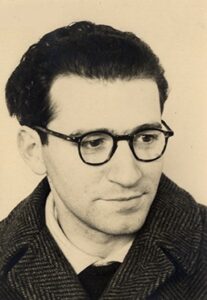 He stayed here from March 17, 1939 to December 27, 1939, after which he left for Fraterwaard 1 in De Steeg near Rheden. Hans stayed since May 1937 together with Rolf Rothmann and Werner Hirschfeld at Gut Winkel in Spreenhagen and arrived here at Teuge airport at the same time. He was a pioneer of the Deventer Association. He had been in hiding in various places since 1941, he lived among others with the Vallinga family in Deventer, the parents of Hennie Smies-Vallinga from Hengelo.
He stayed here from March 17, 1939 to December 27, 1939, after which he left for Fraterwaard 1 in De Steeg near Rheden. Hans stayed since May 1937 together with Rolf Rothmann and Werner Hirschfeld at Gut Winkel in Spreenhagen and arrived here at Teuge airport at the same time. He was a pioneer of the Deventer Association. He had been in hiding in various places since 1941, he lived among others with the Vallinga family in Deventer, the parents of Hennie Smies-Vallinga from Hengelo.
While in hiding Hans had T.B.C. incurred. After the war he came to the sanatorium in Appelscha and later to the ‘Zonnestraal’ sanatorium in Hilversum. Since August 1949 he stayed in a sanatorium of the Hechalutz in Davos, Switzerland. While the authorities were still taking steps for his emigration to Israel, he died in Davos at the end of February 1950. His brother Walter survived the war, as well as probably his sisters Alice and Helene.
- Born 26-05-1916 in Amsterdam.
- Deceased 31-03-1944 in Poland.
- Parents Levie Cohen, diamond knot, and Elisabeth Esther Salomons.
He stayed here from August 26, 1940 to December 10, 1940. Then he left for Amsterdam. He was a pioneer of the Deventer Association. Emanuel was the youngest of a family with two children. He came in February 1936 via Amsterdam to the flight school Teuge. In February 1937 he left for Warnsveld and then from January 1938 to June 1940 to Zenderen. After a short stay with his parents, he joined the Bosscha family in August 1940 as a farmhand. Then he left for his parents in Amsterdam. In 1943 he lived at Transvaalstraat no. 116 I in Amsterdam. Because his father was a voluntary caretaker at the Dutch Israelite District Care, Emanuel also had various activities at the Jewish Council, they were given a postponement of transport.
But on October 18, 1943, Emanuel arrived at camp Westerbork after all. The next day he was already deported to the Auschwitz concentration camp. Like his father, he fell victim to the Holocaust. His mother and brother Lodewijk survived the war.
- Born 04-09-1918 in Szeged, Hungary.
- Deceased 16-04-1943 in Sobibor, Poland.
- Parents Imre Balint and Margit Karliva Brummer.
- Engaged with Wilhelmina Esther Zion.
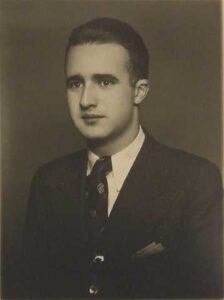 He stayed here from December 31, 1940 to July 14, 1941. Istvan arrived in February 1939 from Hungary via the flight school Teuge in the Netherlands. He was a Palestine pioneer of the Deventer Association. Until February 1940 he stayed in youth hostel ‘De Kleine Haar’ in Gorssel, a branch of the Deventer Association for foreign refugees. Then he left for Bloemendaal no. 48 near Waddinxveen and then to Hasselo. In July 1941 he left for Keizerweg no. 40 in Enschede.
He stayed here from December 31, 1940 to July 14, 1941. Istvan arrived in February 1939 from Hungary via the flight school Teuge in the Netherlands. He was a Palestine pioneer of the Deventer Association. Until February 1940 he stayed in youth hostel ‘De Kleine Haar’ in Gorssel, a branch of the Deventer Association for foreign refugees. Then he left for Bloemendaal no. 48 near Waddinxveen and then to Hasselo. In July 1941 he left for Keizerweg no. 40 in Enschede.
Later he lived with his fiancé Wilhelmina Esther Zion in Eibergen. Zion. The whole family decided to go into hiding at different addresses. One of the addresses was with the Kottelenberg family in Neede, where several Jews were in hiding. Istvan was also housed here together with Julius and Johanna Zion – a brother and sister of Wilhelmina – and Johanna’s baby. In March 1943 the farm was raided. Julius and Istvan had almost escaped when Johanna was picked up with her baby. To prevent the Germans from finding them all, Istvan emerged from hiding. All three were taken to the barracks in Neede and from there to Westerbork.
Istvan came to camp Westerbork – punishment barrack 66 on 27 March. He fell victim to the Holocaust. His fiancé survived the war, as did his parents.
At the Hasselerharm-Luierink family, on the Oldenzaalsestraat near ‘Chinatuin’. The only Catholic farmer where pioneers stayed. All other farmers were Dutch Reformed.
Hirschfeld, Werner Ernst
- Born 26-04-1920 in Breslau, Germany now Poland.
- Deceased 16-03-1986 in Kibbutz Gal’ed, Israël.
- Parents Willi Hirschfeld and Erna Peiser.
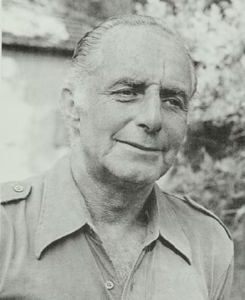 He stayed here from March 1939 to January 31, 1940. Werner went to Havelberg, Germany, to train as a Palestine pioneer. He stayed with Hans Eisner and Rolf Rothmann at Gut Winkel in Spreenhagen and arrived at Teuge airport at the same time. He was a pioneer of the Deventer Association. From here he went nine days later as an agricultural worker to Kleine Driene. After his stay here he left for Velp. Between 1941 and January 1943 he stayed at Schapendijk no. 2 in Almelo. Due to his position as group leader of students, he was deferred from transport.
He stayed here from March 1939 to January 31, 1940. Werner went to Havelberg, Germany, to train as a Palestine pioneer. He stayed with Hans Eisner and Rolf Rothmann at Gut Winkel in Spreenhagen and arrived at Teuge airport at the same time. He was a pioneer of the Deventer Association. From here he went nine days later as an agricultural worker to Kleine Driene. After his stay here he left for Velp. Between 1941 and January 1943 he stayed at Schapendijk no. 2 in Almelo. Due to his position as group leader of students, he was deferred from transport.
From here he left for a hiding place in Friesland with the Gerrit Beintema family in Rottevalle near Drachten. In January 1944 he left there because it was becoming too risky for him. Plans were made with the help of the organization for the trip to Spain. There were eight Jews and some non-Jews, when it turned out that there was a traitor among the latter. They were already picked up on the train in Utrecht on the way. Via the penal prison in Scheveningen, he arrived in camp Westerbork on 5 February 1944. His name was already on the deportation list when he snapped here with the help of other Palestine pioneers in early March. Another flight attempt to Spain was made. Via Max Windmüller’s escape route, he arrived under the pseudonym ‘Willem Henskens’ after a trip through the Pyrenees on April 4, 1944 in the Spanish city of Lerida.
At the end of October 1944 he left – together with Rolf Rothmann – with the ship ‘Guinea’ for Palestine, where he arrived in Haifa on 5 November. Werner went to the kibbutz Gal’ed, where he became a manager on the dairy farm, he was also envoy of the ‘Halutz’ organization in the Netherlands and Germany. He never married. His mother was killed in Auschwitz concentration camp, his brother Heinz survived the war. His father had already died in 1932.
His name and date of birth were on the deportation list of March 3, 1944, with destination Auschwitz. On the basis of these administrative data, Mr. Hirschfeld was officially declared dead by the Ministry of Justice after the war. In 1958, it turned out that Mr. Hirschfeld had escaped deportation and was living in Israel when he filed for a statement of prosecution through a lawyer at the Information Office of the Netherlands Red Cross.
Further Deventer pioneers.
There are still a few pioneers who, according to information from Deventer, lived here, but whose addresses I cannot find out.
- Born 03-05-1919 in Bonn, Germany.
- Deceased 21-02-1944 in Auschwitz-Monowitz, Poland.
- Parents Salomon Berger, cattle dealer, and Elisabeth Berger.
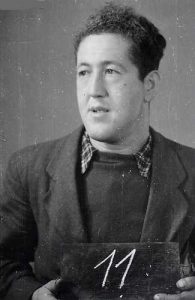 He came to the Netherlands in January 1939 from Bielefeld via the flight school Teuge. He then went to Almelo in February 1939. He stayed in Weerselo from the beginning of October 1939 (address unknown) and left in mid-November 1939 for ‘De Korenbloem’ in Deventer. After a stay in Assen, he lived from September 1941 at Veldbeekweg no. 5 in Boekelo. He was a Palestine pioneer of the Deventer Association. He was born in Bonn but later lived in Siegburg. He was the youngest of three sons, his father died in 1932. Albert was staying in Flensburg with the pioneer association Gut Jägerslust, when he was arrested during Kristallnacht in November 1938 and taken to prison in Kiel. He then came to Sachsenhausen concentration camp until the end of December 1938.
He came to the Netherlands in January 1939 from Bielefeld via the flight school Teuge. He then went to Almelo in February 1939. He stayed in Weerselo from the beginning of October 1939 (address unknown) and left in mid-November 1939 for ‘De Korenbloem’ in Deventer. After a stay in Assen, he lived from September 1941 at Veldbeekweg no. 5 in Boekelo. He was a Palestine pioneer of the Deventer Association. He was born in Bonn but later lived in Siegburg. He was the youngest of three sons, his father died in 1932. Albert was staying in Flensburg with the pioneer association Gut Jägerslust, when he was arrested during Kristallnacht in November 1938 and taken to prison in Kiel. He then came to Sachsenhausen concentration camp until the end of December 1938.
Albert arrived on 3 October 1942 in camp Westerbork – barracks 58 and 64. Here he waited for his “Albersheim declaration” from the emigration service. A medical certificate proving physical fitness for the pioneer work. This didn’t work anymore then. On September 14, 1943, he was still transported from Westerbork to the Extern kommando Auschwitz III-Monowitz. Here the prisoners were put to work in the huge Buna factory complex of the German chemical group IG Farben. His mother died in the Minsk ghetto. His brothers Adolf and Herman survived the war, they had already left for Palestine.
Tausz, Jene/Jannö
- Born 30-07-1918? in Päpa, Hungary.
- He survived the war.
- Parents unknown.
He came from Budapest on June 16, 1939 to the association building at Brink 70 in Deventer and a week later left for Deurningen. Probably with the Arnold ten Kate family at Deurningen no. 17. In mid-July 1939 he left for Palestine with the ship ‘Dora’.
Of the total of 36 Palestine pioneers who lived in the municipality of Weerselo, 25 survived the war. This is partly due to the fact that they were young, strong and well organized. Eight of them left with the last ship the ‘Dora’.
Mariët Blokhuis
Sources:
- Population register of the municipality of Weerselo / Dinkelland.
- Max Windmüller 1920-1945 – Prof. Klaus Meyer-Dettum Ghetto Fighters House Archives
- Eike Besuden (regisseur): `Deckname Cor – Die dramatische Geschichte des Max Windmüllers´ (Pinguin Film); zie www.youtube.com/watch?v=NvNDwpDLBOk en www.youtube.com/watch?v=dbIpyFqM9rM
- Young idealists at the Zeijerveld assen – Jan Ridderbos.
- Etty Hillesum Center in Deventer – Herman Vrielink
- communityjoodsmonument.nl
- http://www.archives.gov.il
- Daniel Abraham http://danielabraham.net/tree/related/dora/
- Orientation of hiding places: Gerrit Welberg, Jan Aarninkhof and Annie Kamphuis-Aarninkhof.
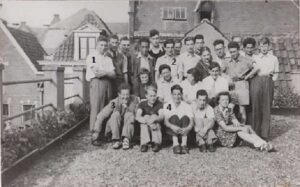
Palestine-pioneers on the roof of the Beth Chaloets house in Deventer.
no. 1 Max Windmüller, 2 Werner Hirschfeld, 3 Albert Berger, 4 Harald Simon
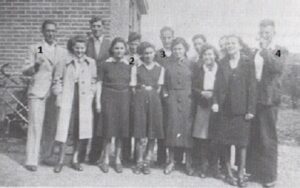
Palestine pioneers in Assen, together with Jewish girls from Assen.
no. 1 Harald Simon, 2 Hans Eisner, 3 Max Windmüller and 4 Schraga Engel.

